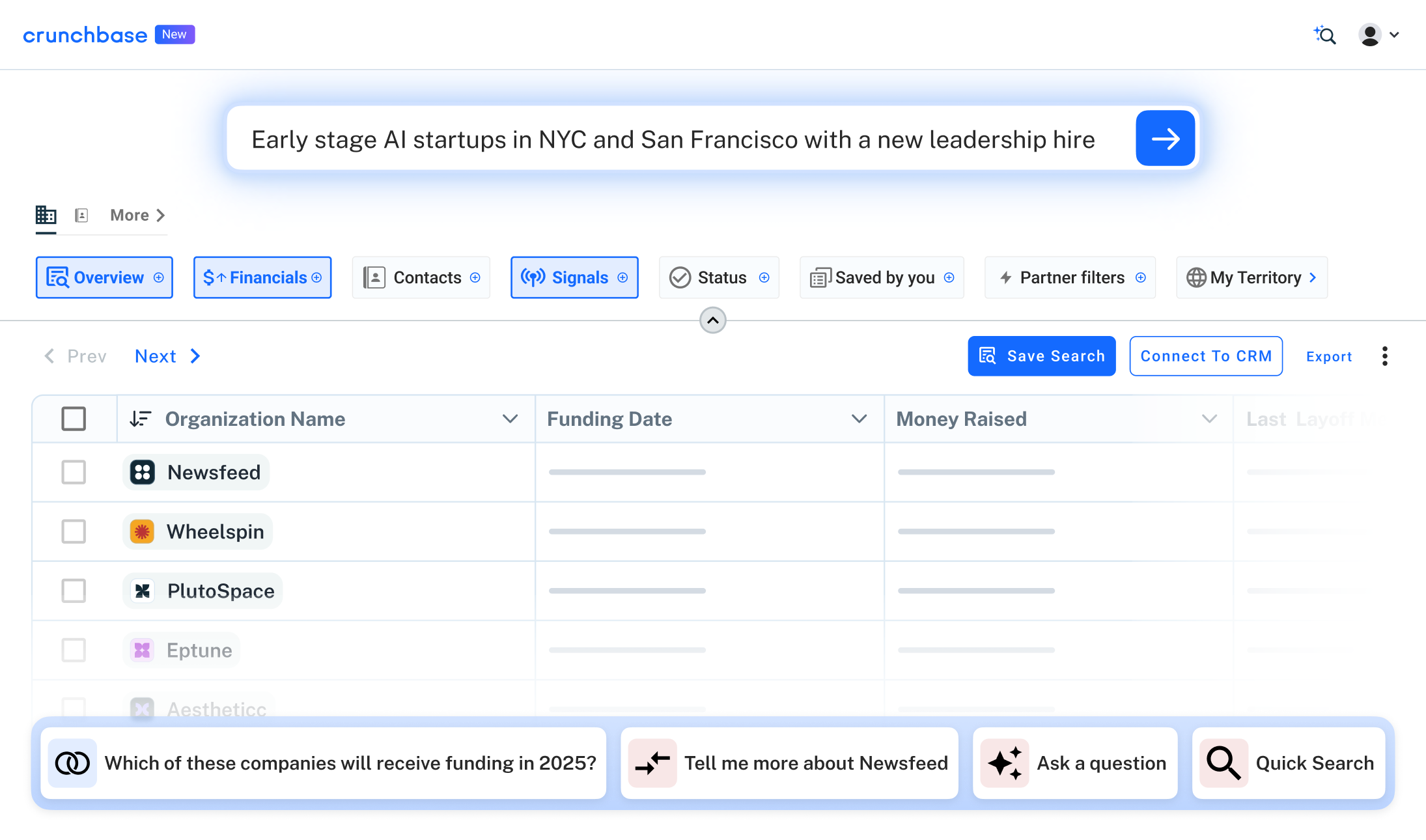Today, many organizations still believe that money is the only motivation. One would think that a higher compensation would produce better results, but research shows the link between motivation, compensation, and performance is much more complex than most organizations realize. Money is often correlated with the idea of status and power — but often, people are motivated more by the power than the actual money.
Find prospects that match your ICP with Crunchbase Pro – try it free
Keeping employees motivated is one of the most important things leadership and management can do for their business. Motivated employees not only contribute more to the company through better day-to-day performance, but they also bring a new level of inspiration to the team through a positive and innovative attitude that can inspire others to follow suit.
It’s no secret that the sales industry is competitive. Oftentimes, sales leaders put together contests in an effort to boost engagement, but they tend to get a short-lived spike in energy that fizzles out fast. Let’s take a look at how sales leaders can use sales gamification and coaching to deliver an engaging experience that lasts.
Learn what your reps value
Finding things that keep your reps motivated and accountable can be difficult — especially for leaders who watch their reps grow over the course of their career — but it is well worth the effort. Focusing on what keeps them motivated in the long term creates a culture of engagement.
Think about the people that work at your organization. More than likely, you have a diverse group with different backgrounds, expectations, and personal goals. In the workforce today, we have four generations working together simultaneously, so finding which incentives work best at your workplace might take a few tries to get right.
For example, Generation Z, the latest generation to enter the workforce, wants to work for an organization that recognizes and appreciates their unique talents. Similar to Gen Z, millennials are more value-driven and care about long-term growth and recognition. Members of Generation X tend to value bonuses and monetary rewards, and baby boomers prefer monetary rewards, but also enjoy nonmonetary rewards such as peer recognition.
Knowing what each generation values can also help determine how they view competition. According to a recent study, baby boomers are highly competitive in teams and individual competitions. Generation X views competition as a way to strive to improve their individual performance. Millennials prefer working together as a team, while Gen Z relishes in a little healthy competition. Sales managers who understand the differences between each generation can do a better job of fostering collaboration and better performance.
Similar to sales gamification, understanding how each generation likes to be coached and communicated with is essential to creating a great culture and experience. Sales coaching can be used for both individuals and teams. Through sales coaching, managers can create formal and effective coaching programs. Millennials and baby boomers prefer team coaching sessions and recognizing wins in real-time, while Generation X and Gen Z enjoy individualized coaching and flexible training.
Celebrate small wins
In sales, it is essential to set goals. While this may seem obvious, without a goal, employees won’t know what to aspire to or what the organization considers a success. And, while your organization might have quarterly or yearly goals, it is important to set smaller, achievable goals that employees can map on a weekly basis to keep them motivated.
The power of small wins also can help bring resilience in times where sales may not be coming in. According to a study by Harvard Business School, small wins can increase positivity, motivate and help employees discover constructive ways of overcoming a challenge. Sales is a difficult industry and reps are used to hearing the word no –– that’s frustrating for anyone. A small win could even be as minimal as a positive interaction with a prospect.
Through sales gamification, sales leaders can help celebrate these small wins by tailoring contests to fit a more reasonable goal. For example, sales leaders could set up a weekly contest and offer an incentive for reps that have sent 20 emails to prospects by noon. Sales reps who meet that goal win a $5 gift card to Starbucks. This concept helps encourage sales reps to stay motivated throughout the sales process and feel their work is valued.
Shoot for lasting results
While immediate results are great, creating a culture of learning should be just as important to achieving those long-term goals. Upskilling reps throughout the duration of their time at the company can help them reach those goals and stay motivated along the way. Not every rep you hire is going to be naturally good at sales. Generally, it takes time for them to learn the ins and outs of a product, how to build a rapport with prospects, and how to manage their time.
Sales coaching is one of the most effective ways to help reps become successful. Coaching provides an opportunity for a leader and rep to work together to find strategic ways to help the rep reach their goals through 1:1 motivation.
Similar to individualized teaching, sales coaching can have a direct impact on a sales rep’s performance. With regular check-ins, correcting negative behaviors, and reinforcing positive behaviors, sales coaching may take on different shapes depending on the structure of your team. However, companies with dynamic sales coaching programs achieve 28 percent higher win rates.
The sales industry often gets a bad rap for being cutthroat, but healthy competition that focuses on the experience can be a great motivator for sales teams. It provides them with the opportunity to improve their individual performance which, in turn, increases company performance.
However, competition isn’t about a monetary reward. This sales gamification should help reps better understand what they need to improve upon and celebrate their small successes.
Mark McWatters is the VP of sales at Ambition. McWatters is from Nashville, Tennessee, and a graduate (and too loyal fan) of the University of Tennessee. He loves all things sales — but only if it’s done with the prospect in mind, not the commission. He lives in Nashville with his wife, two real kids, and his favorite child; his black lab, Layla.
.svg)







